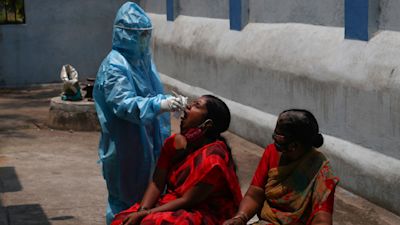Eight cases of Indian Covid variant found in Wales

Eight cases of the Indian variant of Covid-19 have been found in Wales, health bosses have confirmed.
All cases were people who had either returned from India or were "close household contacts".
India was this week added to the UK's red list of travel destinations following a surge in the number of cases there.
It means anyone returning from India must quarantine in a hotel for 10 days.
Non-UK residents who have recently been to India are barred from entering the country.
India has reported more than 150,000 Covid cases a day for the past three weeks.
On Monday 19 April, Prime Minister Boris Johnson cancelled his long-planned trip to India, due to the country's worsening coronavirus situation.
The infection rate across Wales now stands at 15.2 cases per 100,000 people for the seven days up to 16 April, a drop from 15.4 on Tuesday.Health Secretary Matt Hancock said so far 103 cases of the Indian variant had been identified in the UK.Scientists are still looking at whether the variant spreads more easily and evades vaccines.
One professor of immunology has warned that the Indian mutation could “scupper” the UK’s roadmap out of lockdown.
Danny Altmann, a professor of immunology at Imperial College London, has called for Britain to be wary of a third wave after cases of the Indian Covid strain was found in the country.
The warning came despite the number of Covid-19 infections in the UK falling to the lowest level since autumn.
However, Dr Jeffrey Barrett, director of the Covid-19 Genomics Initiative at the Wellcome Sanger Institute, said that while the variant should be watched carefully, it is “probably not at the top tier of mutations that generate the most concern”.
He said it was not yet known whether the variant was driving the current wave of infections seen in India.
What are variants?
Viruses constantly change through mutation, and the emergence of new variants of coronavirus is a natural part of this process.
Some variants will emerge and then disappear, while others persist and can have worrying mutations.
So far we have seen plenty of variants, and they are commonly referred to by where they were first identified - Kent, South Africa, and Brazil are all examples.
Why are some variants concerning?
Scientists are particularly concerned about variants of Covid-19 that have key changes in the spike protein of the virus - meaning they could be more resistant to vaccines or antibodies in people who have had a different strain.
One mutation of particular concern in this area is called E484K.
Variants of concern with the E484K mutation seem to spread more easily and more quickly than other variants, which may lead to more cases and, subsequently, more death.
Some variants may also cause more severe disease.
Which ones are in the UK?
To date, Public Health England (PHE) has seven variants under investigation (VUI), including the one from India.
A VUI is a variant that is being closely examined by experts to see whether it is more deadly, can transmit more easily or may evade vaccines.
If it meets any of these criteria, it moves from being under investigation to become a variant of concern (VOC).
There are currently four variants of concern in the UK: the Kent variant with a specific E484K mutation, the Brazilian variant (carries E484K) and the South African variant (carries E484K).
Investigations are ongoing into the cases of the Indian variant found in the UK, with some of the cases not linked to travel.
But experts say they they do not yet have enough information about its transmissibility, severity or ability to evade vaccines.
Read more:
Boris Johnson cancels India trip over country's worsening coronavirus situation
Why Covid-19 variants cause so much concern - and should we be worried about the India variant?
Indian Covid variant could ‘scupper’ roadmap out of lockdown, scientist warns